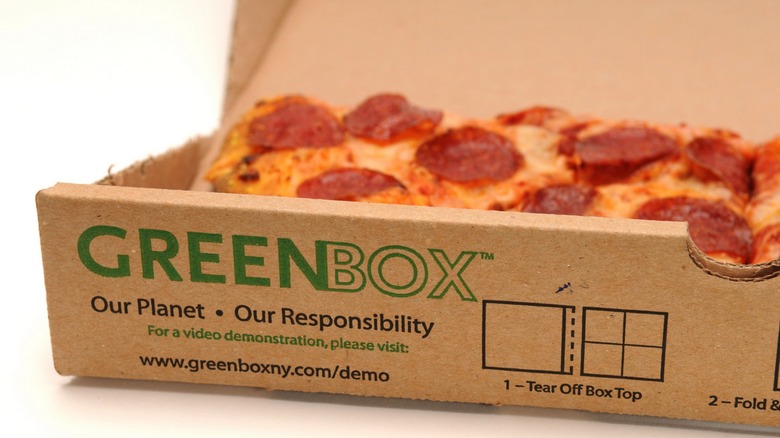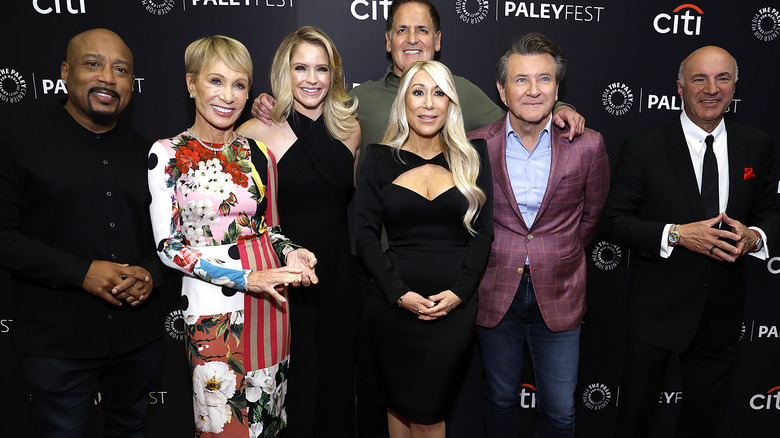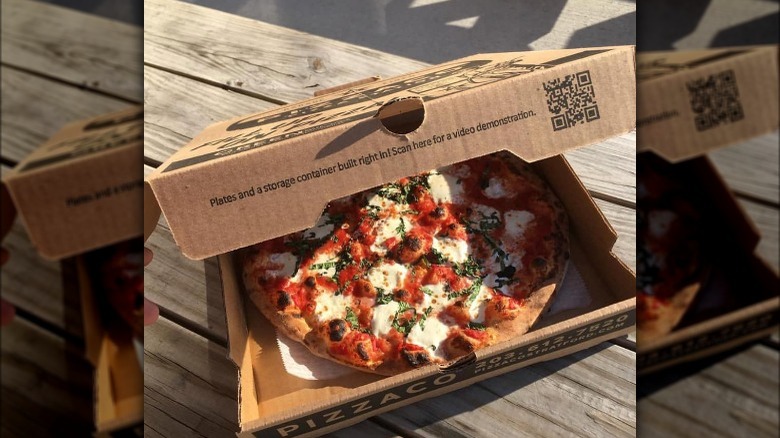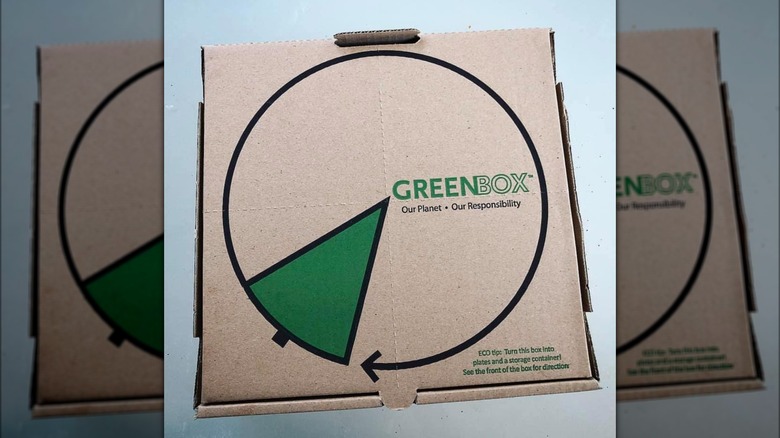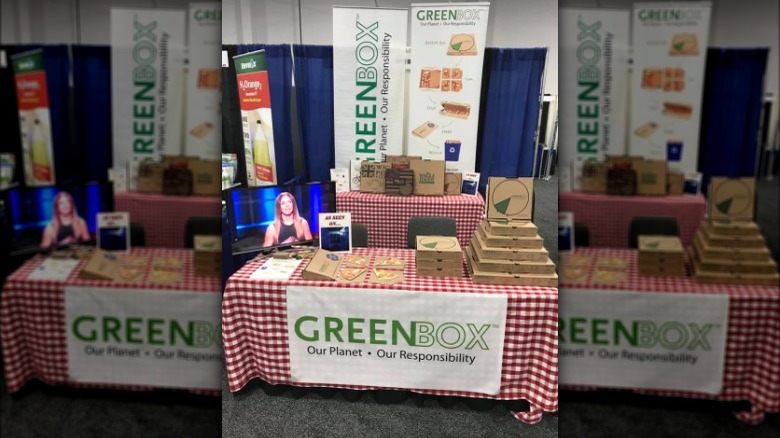GreenBox: Here's What Happened After Shark Tank
The only thing better than fresh pizza is a slice or two of cold leftovers saved for breakfast the next day. What's not so fun, however, is storing them. After all, pizzas come in chunky boxes that take up precious refrigerator space, and you're often left looking for ways to transfer them into more manageable containers. Even then, you're left with a large discarded pizza box that you have to squeeze and maneuver into a trash can. While "Shark Tank" season 14's Pizza Pack offered a way to store leftover pie more effectively, season 6, episode 16's GreenBox had a clever solution that took care of several pizza problems at once.
The idea for GreenBox began with William Walsh and Jennifer Wright-Laracy when the latter was pursuing an MBA at the Columbia Business School. The duo looked at conventional pizza boxes and wondered why they had such little use to them besides carrying hot pies.
Enlisting the help of friend and former chef Ned Kensing, they redesigned the conventional pizza box into a more functional container. And so GreenBox was born: a pizza box whose lid could be ripped into four disposable plates, and whose bottom half could be folded into a small container to store leftover slices more conveniently. To top it off, GreenBox's containers were also made from 100% recyclable materials — a significant feat considering the fact that America alone goes through nearly 3 billion pizza boxes in a year
What happened to GreenBox on Shark Tank?
It was a team of three that began GreenBox, but sadly Walsh passed away in 2011, leaving Wright-Laracy and Kensing to carry forward the legacy of Walsh's invention. The duo entered the Tank hoping to secure a $300K investment in exchange for a 10% stake in GreenBox to help their company scale further. Despite a shaky start, a quick demo of their savvy pizza box was all the entrepreneurs needed to capture the Sharks' attention.
Robert Herjavec noted what an inventive idea it was, adding that he hadn't ever seen anything like it before. However, although GreenBox's containers cost less than a penny more than the usual pizza box, Mark Cuban pointed out that it could add up to a significant number. Pizza boxes are sold in large quantities amounting to millions, so even an additional half-cent per container of GreenBox could catapult into a great expense for chains, making the switch financially detrimental for them.
However, GreenBox had already sold over 10 million pizza boxes and had made more than a million in sales the year before its appearance. Ultimately, Wright-Laracy and Kensing had two offers: one from Kevin O'Leary and another joint deal from Herjavec and Lori Greiner. While the entrepreneurs accepted O'Leary's offer of a $300K investment in exchange for 10% equity, it wasn't exactly a done deal: The offer was contingent on GreenBox making a deal for its boxes with one major pizza company first.
GreenBox after Shark Tank
The Sharks realized that for GreenBox to be successful, its container would have to be sold in extremely large quantities. This is why the deal with O'Leary was always dependent on Wright-Laracy and Kensing making a successful partnership with at least one big-name pizza chain first. However, that never seems to have happened, and, consequently, neither did the deal with O'Leary. The company isn't listed on his portfolio of "Shark Tank" investments — which features the likes of Wicked Good Cupcakes and Snarky Tea.
Despite the lack of an investment and the backing of a Shark, however, GreenBox thrived in the weeks after its episode went on air. Wright-Laracy told Columbia Business School that being on the show gave their multi-functional pizza boxes more credibility in the industry, as well as more publicity across the country.
"The episode has acted as a prime-time commercial that most companies of our size could not possibly afford," the entrepreneur stated, especially considering the number of times their episode aired on reruns. Plus, Wright-Laracy added that "our participation on the show has proven to be a unique selling tool when we reach out to potential new customers and exhibit our products at trade shows." In fact, GreenBox was also featured on "The Rachel Ray Show," as well as on websites such as Bustle and Forbes. So it certainly wasn't all bad news!
Is GreenBox still in business?
Although major chains never quite took on to its pizza boxes, GreenBox had still made its way into several local and regional establishments. Pizzerias such as the New York-based Skinny Pizza and Neapolitan Express, Florida-based PizzaRox, and Great Wolf Resorts switched to GreenBox's containers. In fact, the boxes were also customized to fit more than just pizzas. For instance, Chicago-based Dimo's Pizza turned GreenBox into a delivery container for its brownies, and Washington D.C.'s Z & Z Manoushe Bakery was using it for its flatbreads.
Despite its initial growth, however, GreenBox doesn't seem to be in business any longer — at least not actively. Its website is no longer operational, and its social media accounts have been largely inactive since 2020. The entrepreneurs only made a brief appearance on Facebook and Instagram in 2022 to announce that GreenBox was taken over by Pratt Industries — one of the largest companies in America to make corrugated packaging.
GreenBox had a decade-long history of working with Pratt. The acquisition allowed interested distributors to hop onto Pratt's website and place orders for customized pizza boxes in as little as three steps. However, there's been virtually no news on GreenBox since. Pratt's website lists only one pizza box made from partially recyclable materials — those foldable pizza boxes that could be ripped into disposable plates have practically disappeared since. There is no update on GreenBox's partnership with Whole Foods either.
What's next for GreenBox's founders?
When GreenBox announced that it was acquired by Pratt, the company also mentioned that its founders weren't leaving. Jennifer Wright joined the Pratt team, staying with the GreenBox business in-house, the Instagram post noted. While there was no news about Kensing's future in the company, Wright-Laracy was joining GreenBox under Pratt's stewardship, as was Lexi Fanning, the co-owner and marketing and account coordinator of the pizza box company.
Although there is no news about GreenBox or any of its pizza containers since the acquisition, both Wright-Laracy and Ned Kensing's LinkedIn pages indicate that they are still employed at GreenBox. The former lists her designation as the President whereas the latter is the Vice President of Sales. On the flip side, Fanning works as the account executive at Pratt and has held the position since January 2020. It could be that GreenBox is merely on a hiatus and may be working on rebranding itself or developing more partnerships (perhaps with major pizza chains even), but until there is any official news on the company, viewers will just have to go back to their old and clunky pizza boxes.

